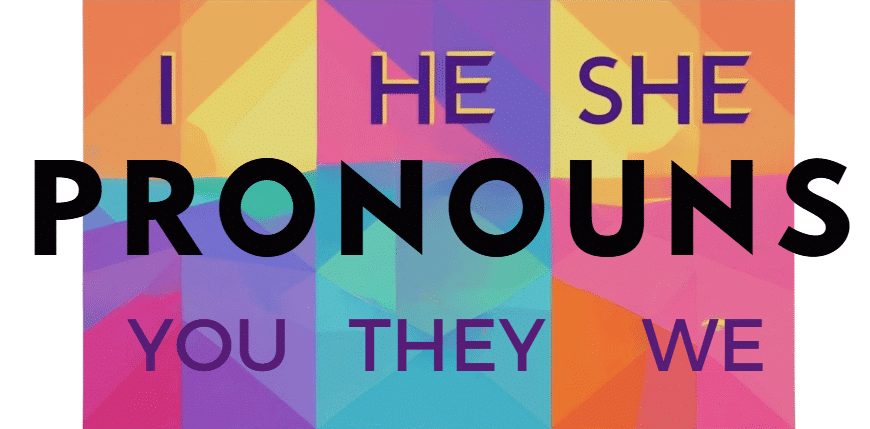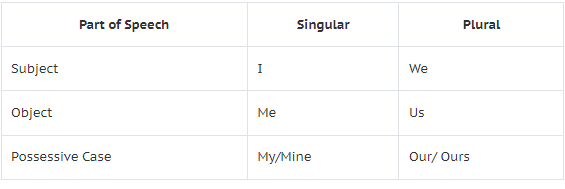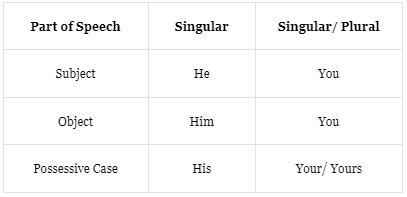Pronoun And Its Kinds | English Olympiad class 5 PDF Download
Pronoun
A Pronoun is a word that takes the place of a noun. For example, instead of saying "Ravi is playing," we can say "He is playing." Common pronouns are he, she, it, they, we, you, and I.

Kinds of Pronoun
There are eight kinds of pronoun. They are
- Personal Pronoun
- Interrogative Pronoun
- Demonstrative Pronoun
- Reflexive Pronoun
- Emphatic Pronoun
- Relative Pronoun
- Indefinite Pronoun
- Reciprocal Pronoun
1. Personal Pronouns
Personal Pronouns are those which are used in place of persons, animals, or things. They are so called, because they stand for the three persons: the first person, the second person, and the third person.
- The Pronouns which refer to the person or persons speaking are called Pronouns of the First Person; as: I, we, me, us, mine, and ours.
- The Pronouns which refer to the person or persons spoken to are called Pronouns of the Second Person; as: you, yours.
- The Pronouns which refer to the person or thing spoken of are called Pronouns of the Third Person; as: he, she, him, his, her, hers, they, them, theirs, and it.
Forms of Personal Pronoun for first person

Forms of Personal Pronoun for Second Person

Forms of Personal Pronoun for Third Person
2. Interrogative Pronoun
Pronouns used for asking questions about persons or things are called Interrogative pronouns.
Examples:
- Who made that noise?
- What is the matter?
The pronouns who, whom and whose are used for asking questions about persons. The pronoun which is used for asking questions about persons or things.
Forms of Interrogative Pronoun
 Note: Do not get confused between interrogative pronouns and interrogative adjectives. An adjective always comes before a noun.
Note: Do not get confused between interrogative pronouns and interrogative adjectives. An adjective always comes before a noun.
Examples:
- Which is your pen? (Interrogative Pronoun)
- Which pen is yours? (Interrogative Adjective)
3. Demonstrative Pronoun
The pronouns which are used to point the objects which they refer to, are known as demonstrative Pronoun.
Examples:
- This is my bicycle.
- That is my school.
In the above sentences, this, these, that, those are used to point out the object or objects for which they are used. This and these refer to things near at hand; that and those refer to things lying at a distance. They are, therefore, called Demonstrative Pronouns.
4. Reflexive Pronouns
Reflexive Pronouns are those, where the action done by their subjects reflect upon them. Self or selves used as suffix with the pronoun in this form.
Read the following sentences.
- I blame myself for my failure.
- We often talk to ourselves in sleep.
The Pronouns myself, ourselves, yourself, yourselves, himself, herself, themselves, itself behave like objects to verbs but they refer to the same persons as the subjects to the verbs. So they are called Reflexive Pronouns.
5. Emphatic Pronoun
The pronouns which are used to put emphasis on a noun or pronoun are known as emphatic pronouns.
Examples:
- I myself was present there.
- We ourselves served the guests.
The pronouns myself, ourselves, yourself, yourselves, himself, herself, themselves itself are used with a noun or a pronoun for the sake of emphasis. Hence they are called Emphatic Pronouns.
Note: Emphatic Pronoun and Reflexive Pronoun are apparently look similar but Emphatic Pronouns are used just after the subject while Reflexive Pronouns are used in place of object.
6. Relative Pronoun
The pronouns which are used to join two sentences are known as relative pronoun.
Examples:
- This is the boy who won the prize.
- This is the girl whom he met.
The pronouns who, whom in the above sentences are called relative pronouns. Pronouns who, whom whose, which and that, which refer back to the noun coming before them. So they are Relative Pronouns.
Forms of Relative Pronoun

7. Indefinite Pronoun
The Pronouns which refer to a person or a thing in general way are called indefinite pronouns.
Examples:
- Some say this and some say that.
- Many have failed in this exam.
The pronouns this refer to persons or things in a general manner. They are hence known as Indefinite Pronouns.
Note: One should always be followed by one and not him or her; as:
- One should have confidence on himself. (Wrong)
- One should have confidence on oneself. (Right)
8. Reciprocal Pronoun
The Pronouns that show the mutual relationship are known as reciprocal pronoun.
Examples:
- The four dogs are quarrelling with one another.
- Two men are fighting with each other.
Here “one another” and “each other” are mutually related.
|
22 videos|27 docs|27 tests
|
FAQs on Pronoun And Its Kinds - English Olympiad class 5
| 1. What is a pronoun? |  |
| 2. What are the different kinds of pronouns? |  |
| 3. How do pronouns help in sentence construction? |  |
| 4. Can you provide examples of how pronouns are used in sentences? |  |
| 5. Why are pronouns important in writing and communication? |  |




























